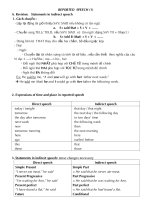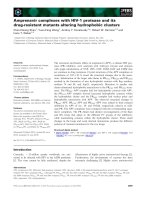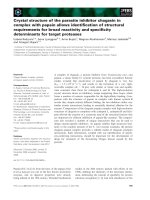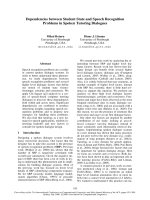- Trang chủ >>
- Sư phạm >>
- Sư phạm hóa
reported speech reported speech with infinitives reported speech with gerund lưu ý chung 0 thay đổi thì của động từ direct speech reported speech 1 present simple v1 2 present cont amisare
Bạn đang xem bản rút gọn của tài liệu. Xem và tải ngay bản đầy đủ của tài liệu tại đây (137.51 KB, 7 trang )
<span class='text_page_counter'>(1)</span><div class='page_container' data-page=1>
<b>REPORTED SPEECH </b>
<b>REPORTED SPEECH WITH INFINITIVES </b>
<b>REPORTED SPEECH WITH GERUND </b>
</div>
<span class='text_page_counter'>(2)</span><div class='page_container' data-page=2>
<b>0 THAY ĐỔI THÌ CỦA ĐỘNG TỪ:</b>
<b>Direct speech</b> <b>Reported speech</b>
1. Present simple: V1
2. Present cont.:am/is/are + Ving
3. Persent pecfect: has/ have + V3/ed
4. Past simple: V2/ed
5. Past cont.: was/ were + Ving
6. Past perfect: had + V3/ed
7. Future simple: will/shall + V0
8.can
9. may
10. must
Past simple: V2/ed
Past cont.: was/were + Ving
Past perfect: had/V3/ed
Past perfect: had + V3/ed
Past cont.: was/ were + Ving
Past perfect: had + V3/ed
would / should +V0
could
might
had to
<b>1 THAY ĐỔI TRẠNG TỪ CHỈ THỜI GIAN VÀ NƠI CHỐN:</b>
<b>Direct speech</b> <b>Reported speech</b>
1. today/ tonight
2. yesterday
3. last week
4. ago
5. now
6. tomorrow
7. next week
8. this
9. these
10. here
that day/ that night
the day before
the week before
before
then
the following day
the following week
that
those
there
EX: He said to me, “I and you will go with her father next week.”
He told me (that) he and I would go with her father the following week.
<b>2 THAY ĐỔI NGÔI: </b>
- Đổi ngôi thứ NHẤT phù hợp với CHỦ TỪ trong mệnh đề chính.
- Đổi ngơi thứ HAI phù hợp với TÚC TỪ TRONG MỆNH ĐỀ CHÍNH
- Ngơi thứ BA không đổi.
<b>Subject</b> <b>Object</b> <b>Possessive</b>
<b>Adjective</b>
<b>Possessive</b>
<b>Pronoun</b>
</div>
<span class='text_page_counter'>(3)</span><div class='page_container' data-page=3>
I me my mine myself
You you your yours yourself
He him his his himself
She her her hers herself
It it its its itself
We us our ours ourselves
They them their theirs themselves
You you your yours yourslves
<b> REPORTED SPEECH </b>
<b> Reported speech statements</b>
1. Đổi động từ giới thiệu sang: “said” hoặc “told”.
2. Khi đổi câu trực tiếp (stataments) sang gián tiếp, ta đổi BA yếu tố: ngơi, thì
<i>của động từ và trạng từ chỉ thời gian và nơi chôn. (xem phần lưu ý chung)</i>
EX1 He said to me, “I and you will go with her father next week.”
He told me (that) he and I would go with her father the following week.
EX2 He said to me, “I and you will go with her father next week.”
He told me (that) he and I would go with her father the following week.
EX3 He said to me , “I and you will go with her father next week.”
He told me (that) he and I would go with her father the following week.
S + said (to + O) + that + S + V …
S + told + O + that + S + V …
<b> Reported speech yes / no questions</b>
1. Đổi động từ giới thiệu sang “asked”.
2. Thêm if hoặc whether vào trước câu gián tiếp.
3. Đổi câu hởi ra thành câu xác định.
4. Thay đổi ba yếu tố: ngơi, thì của động từ, trạng từ chỉ nơi chốn và thời gian.
(xem phần lưu ý chung)
EX1 He said to me,”Will you go with her father next week?”
He asked me if / whether I would go with her father the following week.
EX2 He said to me, “Will you go with her father next week?”
He asked me if / whether I would go with her father the following week.
EX3 He said to me, “Will you go with her father next week?”
</div>
<span class='text_page_counter'>(4)</span><div class='page_container' data-page=4>
S + said (to + O) + that + S + V …
S + asked + O + if / whether + S + V …
<b> Reported speech Wh questions</b>
1. Đổi động từ giới thiệu sang: “asked”.
2. Giữ nguyên từ hỏi: Who, What, When, Why, How, …
3. Đổi câu hỏi thành câu xác định.
4. Thay đổi ba yếu tố: ngơi, thì của động từ, trạng từ chỉ nơi chốn và thời gian.
(xem phần lưu ý chung)
EX1 He said to me,”Why did you go with her father last week?”
He asked me why I had gone with her father the week before.
EX2 He said to me, “Why did you go with her father last week?”
He asked me why I had gone with her father the week before.
EX3 He said to me, “Why did you go with her father last week?”
He asked me why I asked gone with her father the week before.
S + said (to + O) + that + S + V …
S + asked + O + wh- + S + V …
<b> Reported speech imperatives</b>
1. Đổi động từ giới thiệu sang: “asked, told, ordered, advised …”
2. - Nếu là câu khẳng định <sub></sub> thêm To vào trước động từ.
- Nếu là câu ra lệnh phủ định <sub></sub> thêm NOT TO vào trước động từ.
3. Thay đổi ba yếu tố: ngơi, thì của động từ, trạng từ chỉ nơi chốn và thời gian.
(xem phần lưu ý chung)
EX1 He said to me, “Give your toys to her, please!”
He asked me to give my toys to her.
EX2 He said to me “ Don’t open this book now.”
He asked me not to open that book then.
EX3 He said to me, “Give your toys to her, please!”
He asked me to give my toys to her.
EX4 He said to me “ Don’t open this book now.”
He asked me not to open that book then.
</div>
<span class='text_page_counter'>(5)</span><div class='page_container' data-page=5>
<i><b>a. Shall/ would dung để diễn tả đề nghị, lời mời.</b></i>
EX1 “Shall I bring you some tea?” he asked.
He offered to bring me some tea.
EX2 “Shall we meet at the theater?” he asked.
He suggested meeting at the theater.
<i><b>b. Will/ would dung để diễn tả sự yêu cầu</b></i>
EX1 “Will you help me, please?
He asked me to help him.
EX2 “Wil you lend me your dictionary?”
He aske me to lend him my dictionary.
<i><b>c. Câu mệnh lệnh và câu yêu cầu trong lời nói gián tiếp.</b></i>
EX1 Go away!
He told me to go away.
EX2 Listen to me, please.
He asked me to listen to him.
<i><b>d. Các hình thức hỗn hợp trong lời nói gián tiếp.</b></i>
- Lịi nói gián tiếp có thể bao gồm nhiều hình thức hỗn hợp: câu khẳng định, câu
hỏi, câu mệnh lệnh, câu cảm thán.
EX1 She said, “Can you play the piano?” and I said “no”.
She asked me if could you play the piano and I said that I couldn’t.
<b> REPORTED SPEECH WITH INFINITIVES </b>
Lời nói có liên quan đến thành hành động (lời hứa, lời đồng ý, mệnh lệnh, lời đề
nghị, lời yêu cầu, lời khuyên, lời gợi ý) thường được thuật lại bằng động từ
nguyên mẫu có to (infinitive) hoặc tân ngữ + động từ nguyên mẫu (object +
to-infinitive).
EX1 He promised to write.
EX2 I adivise you to think again before you decide.
<b> Orders</b>
“Verb …” Subject + told + object + to
</div>
<span class='text_page_counter'>(6)</span><div class='page_container' data-page=6>
EX1 “Open the windows. Turn on the lights”, my mother said.
My mother told me to open the windows and turn on the lights
EX2 He said, “Don’t wait for me”.
He told me not to wait for him.
<b> Requests</b>
“Will you …?” Subject + asked + O + to
“Would you …?” requested not to + infinitive
“Could you …?”
EX1 “Would you turn down the radio, please?”, she said.
She asked me to turn down the radio.
<b> Advise</b>
“If I were you, I would …” Subject + advised + O + to
“You should …” not to + infinitive
EX1 “You should stop smoking, Peter’, Ann said.
Ann advised Peter to stop smoking.
EX2 “If I were, I wouldn’t stay up late.”, she said
She advised me told not to stay up late.
<b>REPORTED SPEECH WITH GERUND </b>
<b> Mệnh đề danh động từ có thể được dung thay cho mệnh đề that trong lời nói </b>
gián tiếp sau các động từ giới thiệu: accuse of, advise, admit, apologise for, deny,
ainsist on, mention, propose, recommend, report, suggest.
EX1 “you took the money!”
He accused me of taking the money.
EX2 “I stole it”
He admitted stealing it.
<b> V + O + pre. + gerund</b>
accuse (of), congratulate (on), forgive (for), prevent (from), suspect (of) thank
(for), warn (against)
EX1 They accused me of telling lies.
</div>
<span class='text_page_counter'>(7)</span><div class='page_container' data-page=7></div>
<!--links-->









